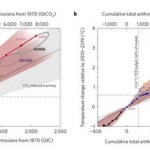fossil fuels
Much is being made of a new paper in Nature Geoscience in which the authors recalculate "Emission budgets and pathways consistent with limiting warming to 1.5 °C." Whether the authors are justified in their marginally optimistic conclusions — and there's plenty of debate about that — there really isn't much in the way of policy guidance here. Just look at this money quote in Nature:
“The Paris goal of 1.5 °C is not impossible — it’s just very, very difficult,” says lead author Richard Millar, a climate researcher at the University of Oxford, UK.
Or as Millar and his colleagues put in in their…
“The monitoring of the atmosphere, of the surface of the Earth, of what’s going on in the ocean and under the ice — all of that is overwhelmingly funded by the federal government.”
— Former Obama science adviser John Holdren
The other day a friend of mine who works in Beijing as a foreign correspondent suggested that of all the acts of stupidity committed by Donald Trump since assuming office, the thing that bothers him the least is the decision to withdraw from the Paris climate change agreement. Haven't we actually moved beyond relying on government to reduce carbon emissions? he asked. Isn…
The Conference Board of Canada, usually described as a business-friendly think tank, has come out with a report that is refreshingly honest, and even a bit subversive — especially if you pay extra attention to some sidebars, consider what the authors deliberately left out, and are at least a little familiar with the science of power consumption and generation.
The full report, which is behind a freewall — it is downloadable for the cost of supplying your contact information — concludes that converting Canada's economy to a carbon-free energy mix won't actually cost all that much.…
The most charitable comment I can come up with for the just-released Department of Energy Staff Report to the Secretary on Electricity Markets and Reliability is the refusal of the authors to use what is surely a candidate for Most Overused Term of the Year: resilience. Not that resilience isn't important, but it's to their credit that the staffers responsible for telling Secretary Rick Perry sort-of what he wanted to hear understand that reliability is really what it's all about.
After all, if there's one thing that defenders of fossil fuels and nuclear power like to remind us more than…
On Class M, James Hrynyshyn shows us how climate change will benefit the economies of some U.S. counties while damaging many others. This mostly has to do with location; coastal areas and southern latitudes are more threatened, with Florida poised to suffer worst of all. James writes, "we're not just talking about polar bears anymore. It's now about jobs, wages, infrastructure, crime." Meanwhile, William M. Connolley reports Antarctica's Larsen C ice shelf is 12% smaller due to a giant iceberg splitting off and heading (presumably) toward Miami. Greg Laden says denial of global warming has…
I previously posted a summary of the water-related conclusions from the new National Climate Assessment, recently released after three years of writing, review, and analysis. The following “findings” are a broader summary of the results from the newly released National Climate Assessment (NCA). They are by no means a full summary: far more detail can be found in the chapters and the regional syntheses, but these are noteworthy conclusions. (Note, thanks to Tim Smith – Sustainable Water Resources Coordinator – for highlighting these. The page numbers refer to the NCA Summary)
1. Global climate…
Apologies for the blatant exploitation of an ostensibly tangential news story to drive traffic to this blog. But I think there is a connection, and it's high time I resurrected Class M.
The spark is, of course, the revelations about Toronto Mayor Rob Ford's contempt for the people who elected him. Toronto doesn't deserve to be embarrassed, at least not in this manner. The latest affront to decency comes in the form of a drunken rant during which the mayor threatens to kill someone. Sooner or later, the city will be relieved of Ford, but in the meantime, we can contemplate how it is that a man…
It is time we just said “no.”
There is growing attention to climate change in the media; and there is a growing realization that decisions we make today will have a lasting effect on the world’s climate tomorrow.
But there is still a gap – a chasm really – between the reality of climate change and our day-to-day choices, investments, and public debates about water, energy, food, and resources.
Here is the reality: the burning of fossil fuels is the leading contributor of gases that are already changing the planet’s delicate climate, and the climate will continue to change in an exponentially…
Every now and then someone who ordinarily makes a fair amount of sense writes something that serves only to remind us that even the extraordinarily smart can be extraordinarily wrong. So it was with Sam Harris's defense of gun rights, The Riddle of the Gun.
First, Harris insists that "the correlation between guns and violence in the United States is far from straightforward." He doesn't really attempt to bolster that argument with relevant facts, though, and there there's little point in an all-too-easy exercise in debunking. In fact, that's not even his central thesis. No, that would be good…
As if you needed another reason to lament the state of American politics:
Across the country, activists with ties to the Tea Party are railing against all sorts of local and state efforts to control sprawl and conserve energy. They brand government action for things like expanding public transportation routes and preserving open space as part of a United Nations-led conspiracy to deny property rights and herd citizens toward cities. (New York Times, Feb 3, 2012)
The story ends on what would be a humorous note:
"The Tea Party people say they want nonpolluted air and clean water and everything…
The thing about the "Durban Platform for Enhanced Action," is that it simultaneously manages to both exceed expectations and demolish any remaining hope for real action. In effect, it tells us everything we need to know about geopolitics of climate change.
As the name implies, this is an agreement for further negotiations. The basic idea is the world will talk for another four years, with the ultimate goal of some kind of undefined "legal" agreement on reducing greenhouse gas emissions beginning in 2020. Given how far apart are the developing and developing worlds on who is responsible for…
I would be remiss if I didn't direct your attention to a new paper in Science that concludes, however tentatively, that the global climate may not be as sensitive to rising atmosheric CO2 levels as everyone has assumed. It is, after all, a rare dose of optimism in a field that has been characterized by "it's worse than expected" findings for pretty much its entire history.
"Climate Sensitivity Estimated From Temperature Reconstructions of the Last Glacial Maximum" appeared last week on American Thanksgiving, thus managing to avoid much in way of media coverage. Science has put it behind a…
Australia's Senate has approved a controversial law on pollution, after years of bitter political wrangling. The Clean Energy Act will force the country's 500 worst-polluting companies to pay a tax on their carbon emissions from 1 July next year.
-- BBC
Don't get me wrong. I love NPR. I listen to it for at least four hours a day. But lately I've found the network's embrace of "he said, she said" journalism a little too difficult to swallow. This morning's report on censorship of a scientific report commissioned by the Texas Commission on Environmental Quality isn't perhaps the most egregious example, but it does concern climate change, so it's worth examining.
For those unfamiliar with this lazy and cowardly form of reporting, check out new media maven Jay Rosen's take. Basically, the problem is NPR is afraid to let its reporters come right…
Fill in the blanks:
It is customary in the popular media and in many journal articles to cite a projected _________ figure as if it were a given, a figure so certain that it could virtually be used for long-range planning purposes. But we must carefully examine the assumptions behind such projections. And forecasts that ________ is going to level off or decline this century have been based on the assumption that the developing world will necessarily follow the path of the industrialized world. That is far from a sure bet.
That comes from an essay at Yale's e360.
Given that you're reading a…
A letter in Climatic Change looking at the life-cycle greenhouse warming potential of natural gas raised a lot of hackles a little while back. If, as the authors posit, replacing coal and oil combustion with gas-fired turbines could actually accelerate global warming rather than slow it down, then we have a serious problem, given the investments being made in gas.
Much the skepticism about that study could be traced to the background of the lead author, Robert Howarth, who happens to have a history of opposing gas fracking. Of course, Howarth's scientific credentials, or his activism, have…
Number of hits returned when Googling news sources for "James Hansen" (head of NASA's Goddard Institute for Space Studies and perhaps the world's best-known climatologist, who was arrested in front of the White House this week as part of a coordinated climate change campaign) and "Keystone" (XL, the expansion of a continental oil pipeline that will bring Canadian oil sands product to refineries in the southern U.S.): 208
Number of hits returned when Googling news sources for "Daryl Hannah" (Splash and Blade Runner actress) and "Keystone": 659.
(Searches carried out Aug. 31, 2011 at 8:50 a.m.)
Debating the merits and dangers of fracking shale gas has become a major obession of those who worry about energy and the climate. Yale's e360's latest contribution comes in the form a forum that includes a wide variety of perspectives pro and con.
For me, the wisest observation, and the one that really trumps all others, comes from Kevin Anderson, who directs the Tyndall Centre for Climate Change Research's energy program:
... the only responsible action with regard to shale gas, or any "new" unconventional fossil fuel, is to keep it in the ground -- at least until there is a meaningful…
The flaws with Wednesday's anti-renewables op-ed in the New York Times begin with the headline and continue through just about every paragraph. On second thought, perhaps the problems begin with the decision of the New York Times to run "The Gas Is Greener" in the first place. But let's start with the headline.
"The Gas is Greener" may seem like a clever double entendre, referring as it does to wishful thinking and the alleged merits of natural gas as a relatively clean source of energy. But it fails on both counts. First, the entire essay is predicated on the notion that environmentalists…
OK. Taking on logical flaws in Wall Street Journal op-ed items is about as difficult as shooting fish in a barrel, but I can't let Matt Ridley's latest affront to common sense pass without firing off a few rounds for practice if nothing else.
Under a staggeringly unimaginative headline of "Inconvenient Truths About 'Renewable' Energy," Ridley argues that renewable energy isn't really renewable, or at least no more renewable that fossil fuels. How does he go about this without shattering his backbone? By pointing out that Haitians are destroying their half of their island home by cutting down…

